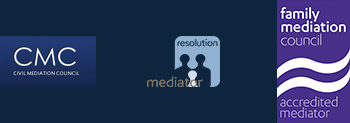There are a number reasons why people turn to mediation to resolve disputes.
Firstly, mediation is a way of reaching resolution of a problem with the minimum of confrontation and hostility and without the ill feeling and hurt that can often follow a court case which, by its very nature, will result in a winner and a loser. Mediation helps parties to come to an agreement in a neutral setting.
Civil and commercial mediation generally begins with all parties in the same room and, because communication is direct rather than through solicitors’ letters, this encourages understanding and cooperation. Smaller sessions may also be appropriate. Family mediation begins with individual sessions but soon moves on to joint meetings where issues can be explored and solutions identified.
Mediation discourages confrontation and promotes cooperation by focusing on the shared nature of the problem, rather than the entrenched positions into which parties may have settled. This can be absolutely vital if there will be an enduring relationship between the parties after the dispute at hand has been resolved – for example, in family and neighbourhood disputes or those between employee and employer or student and school.
The second advantage is speed. Everyone who is familiar with the courts or reads the newspapers regularly will know that legal cases take an incredible amount of time to come to trial. Mediation is arranged at the mutual convenience of participants and is invariably much quicker.
The time between first enquiry and final resolution will generally be measured in days and not months in civil mediation, and while family mediation generally takes longer, it is still a much faster process than the traditional approach.A further benefit is a greatly reduced level of stress.
People who take part in trials of any sort generally say afterwards that it was one of the most stressful experiences of their lives. Mediation is entirely different. There is no judge, no imposing surroundings of a court and no cross-examination by a hostile lawyer. Mediation is in all respects far less stressful than a court case.
Perhaps the final benefit of mediation is its cost in comparison to litigation. Legal action is very expensive and the higher in the legal process the case proceeds, the bigger the bill. Mediation costs a fraction of the amount of a court case. In civil mediation the costs are agreed in advance by all parties and are based on the estimated length of the mediation session and whether facilities are to be provided. These costs are split between the participants, generally half each. Family mediation is a little less predictable, but generally speaking all the issues have been resolved within 5 or 6 sessions, often fewer.


